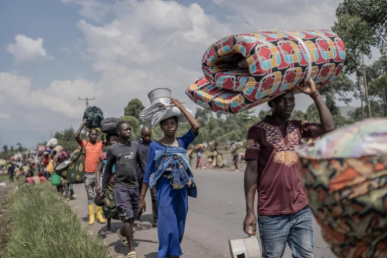Rwanda-Linked Rebels Threaten DRC Capital After Seizing Strategic City of Goma
Introduction
The Democratic Republic of Congo (DRC) is facing another wave of instability as Rwanda-backed M23 rebels intensify their offensive. After claiming control of Goma, a key city in eastern DRC, the rebels have now threatened to march toward Kinshasa, the country’s capital. This alarming development has heightened tensions in the region and raised fears of a full-scale war. This article explores the recent events, the background of the conflict, the impact on civilians, and possible international interventions.
The Fall of Goma: A Strategic Victory for M23
Goma, a city of over a million people, is a significant economic and logistical hub in eastern DRC. Its capture by the M23 rebels marks a critical turning point in the ongoing conflict. The rebels claim that the Congolese government has failed to honor previous peace agreements, justifying their military advance. The fall of Goma gives the rebels a stronghold to launch further attacks and strengthens their bargaining position in negotiations.
Historical Context: Rwanda’s Alleged Involvement
The M23 rebellion traces its roots to earlier conflicts in the DRC, particularly the Second Congo War (1998-2003). The rebel group is believed to be backed by Rwanda, a claim that Rwandan authorities have repeatedly denied. However, reports from the United Nations and other international bodies suggest that Rwanda has provided logistical and military support to M23, fueling tensions between the two neighboring nations. The involvement of regional players has made it difficult to find a lasting solution to the crisis.
Impact on Civilians and Humanitarian Crisis
As the conflict escalates, civilians are bearing the brunt of the violence. Thousands have been displaced from their homes, seeking refuge in makeshift camps or crossing into neighboring countries. The humanitarian situation is dire, with shortages of food, medical supplies, and clean water. Many humanitarian organizations have called for an immediate ceasefire to allow aid to reach those in need. Reports of human rights violations, including executions and sexual violence, have further exacerbated the crisis.
The Response of the Congolese Government
The DRC government has condemned the actions of M23 and accused Rwanda of destabilizing the region. President Félix Tshisekedi has vowed to defend Congolese sovereignty and has called for military reinforcements. However, the Congolese army has struggled to contain the well-equipped and organized M23 fighters. The government is also seeking diplomatic solutions by engaging regional and international stakeholders in an attempt to de-escalate the situation.
Regional and International Reactions
The African Union, United Nations, and neighboring countries have expressed deep concern over the recent developments. Diplomatic efforts are being made to mediate between the DRC and Rwanda, but tensions remain high. Countries like Uganda and Burundi, which have their own interests in the region, are closely monitoring the situation. The United States and European Union have also called for an immediate halt to the fighting and urged Rwanda to cease any support for M23.
The Risk of Full-Scale War
The current escalation poses a serious risk of plunging the region into another prolonged war. If M23 continues its advance toward Kinshasa, it could lead to an all-out conflict involving multiple nations. The DRC has a history of being a battleground for regional rivalries, and another war could have devastating consequences for millions of people. The international community must act swiftly to prevent further bloodshed and work towards a sustainable peace agreement.
Possible Paths to Peace
Efforts to resolve the conflict must include both military and diplomatic strategies. Strengthening the Congolese army through training and equipment could help counter rebel advances. Additionally, diplomatic negotiations involving regional leaders, international organizations, and civil society groups could provide a platform for addressing grievances and finding a lasting solution. Economic development in the region, coupled with political reforms, could also help address the root causes of instability.
Conclusion
The capture of Goma by M23 rebels and their threat to take Kinshasa mark a dangerous turning point in the DRC conflict. The situation remains volatile, with millions of lives at risk due to violence and displacement. While military responses are necessary to protect territorial integrity, diplomatic efforts and international cooperation are crucial for achieving long-term peace. The coming weeks will be critical in determining the future of the DRC and the stability of the entire Great Lakes region.


Leave a Comment